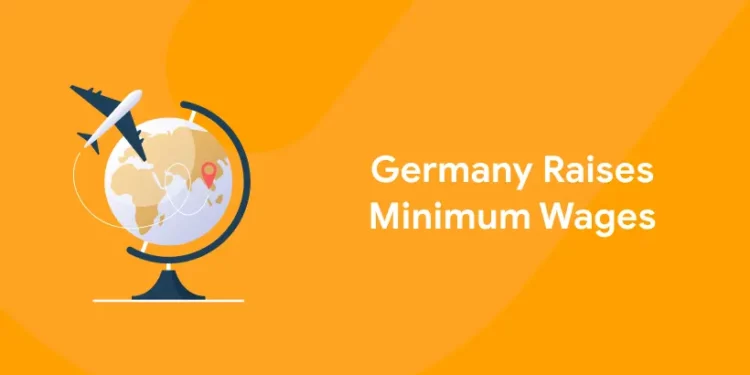Table of Contents
Key Takeaways:
- Germany’s minimum wage is now €12.82 per hour, with further increases planned for 2026 and 2027.
- The increase benefits workers, reduces wage inequality, and supports economic growth.
- Employers may face higher costs but can adapt with efficiency improvements and government support.
- Germany’s work culture emphasizes flexibility, work-life balance, and employee well-being.
- Learning German is essential for career success and integration in Germany.
Introduction
Germany’s latest move to raise its minimum wage is more than just a headline—it’s a milestone for workers, employers, and anyone eyeing opportunities in Europe’s largest economy. As of January 2025, the statutory minimum wage in Germany has climbed to €12.82 per hour, with further increases planned for 2026 and 2027. This decision reflects Germany’s commitment to fair pay, economic resilience, and social protection amid rising living costs and global economic shifts.
The hike is not just about numbers. It’s about dignity, opportunity, and a better quality of life for millions of workers. For expats and job seekers, it signals a dynamic labor market that values both local and international talent. Let’s dive into the details and explore what this change means for everyone.
Germany’s Minimum Wage: The Latest Rates and Projections
1: How do you say "Good Morning" in German?
Germany’s minimum wage system is one of the most robust in Europe. The current rate of €12.82 per hour translates to roughly €2,222 per month for full-time workers, or €26,666 annually. The government has approved further increases: €13.90 per hour from January 2026 and €14.60 per hour from January 2027. These hikes are part of a long-term strategy to ensure wages keep pace with inflation and living standards.
| Year | Hourly Rate (€) | Monthly Rate (€) | Annual Rate (€) | Increase (%) |
|---|---|---|---|---|
| 2025 | 12.82 | 2,222 | 26,666 | 3.3 |
| 2026 | 13.90 | 2,410 | 28,920 | 8.4 |
| 2027 | 14.60 | 2,537 | 30,444 | 5.0 |
Free German A1 Mock Tests – Powered by AI!
Test your skills on our interactive platform. Get instant feedback from our AI to help you communicate better and track your progress. Start your free German mock test now.
Test Your German A1 for FreeWho Benefits from the Minimum Wage Increase?
The new minimum wage applies to the vast majority of employees in Germany, including part-time workers, students, and temporary staff. Around20% of the workforce earns at or near the minimum wage, so the impact is widespread. However, certain groups are exempt, such as apprentices, interns, and volunteers.
The increase is particularly beneficial for low-wage workers in sectors like retail, hospitality, and healthcare, where wage growth has historically lagged behind other industries. It also helps students who work part-time, allowing them to earn more while studying and reducing the financial burden of living costs.
|
German A2 Exercises – Download Free PDF |
||
What is the Impact on Workers and Employers
For workers, the higher minimum wage means more take-home pay, improved living standards, and greater financial security. Studies show that minimum wage policies have reduced wage inequality and boosted consumer spending, which in turn supports economic growth. Workers may also experience more job security and opportunities for career advancement as employers invest in retaining talent.
Employers, especially small and medium-sized businesses, face higher labor costs. Some may need to adjust their budgets or streamline operations to absorb the increase. However, higher wages can also lead to increased productivity and reduced employee turnover, which benefits businesses in the long run. The government may offer support or incentives to help employers adapt, such as tax breaks or grants for workforce training.
Also read: Top Opportunities in Other Countries After Learning German
Are There Any Regional and Sectoral Differences
The impact of the minimum wage hike varies by region and sector. In eastern Germany, where average wages are lower, the increase is more pronounced and could help narrow the wage gap with western regions. Sectors like retail, hospitality, and healthcare are most affected, while tech and finance may see less direct impact.
Germany also has sector-specific minimum wages negotiated through collective bargaining agreements. For example, temporary employment agencies must pay workers between €14.00 and €14.53 per hour, while skilled trades like construction and electrical work have negotiated rates ranging from €13 to over €18 per hour, depending on skill level and region. This two-tier system ensures that workers in high-demand industries earn above the statutory minimum, reflecting both sector needs and skill levels.
Free German A1 Mock Tests – Powered by AI!
Test your skills on our interactive platform. Get instant feedback from our AI to help you communicate better and track your progress. Start your free German mock test now.
Test Your German A1 for FreeInternational Comparison and Economic Context
Germany’s minimum wage is among the highest in Europe, second only to Luxembourg. The EU average is around €10.50 per hour, making Germany a leader in worker protection. Countries like France and Spain have lower minimum wages, while Nordic nations rely more on collective bargaining.
The recent hikes are part of a broader trend across Europe, driven by inflation and the European Minimum Wage Directive. While Germany’s increases are substantial, they fall short of the €15 per hour target advocated by some labor groups. The government’s cautious approach aims to balance worker protection with economic stability, especially after two years of economic contraction and rising unemployment.
Also read: Germany’s Booming Energy Industry
Work Culture, Lifestyle, and Schengen Visa Benefits
Germany’s work culture is known for its emphasis on flexibility, work-life balance, and employee well-being. Flexible hours, remote work, and mental health initiatives are increasingly common, making Germany an attractive destination for professionals. Employees value the country’s strong work-life balance, with generous vacation time and family-friendly policies.
The Schengen visa is another major benefit for workers and expats. It allows free movement across 26 European countries, making it easier to travel, work, or study in the region. This flexibility is a significant advantage for those looking to build international careers or explore new opportunities in Europe.
|
Goethe 2025 Exam Dates: Multiple Test Centers |
|
| Trivandrum Goethe Exam Dates | Kochi Goethe Exam Dates |
| Chennai Goethe Exam Dates | Coimbatore Goethe Exam Dates |
Entri’s German Language Course: Unlocking Opportunities
Learning German is essential for anyone looking to work or live in Germany. Entri’s German Language Course offers comprehensive training for beginners and advanced learners, focusing on practical skills for work and daily life. The course covers essential vocabulary, grammar, and cultural insights, helping learners communicate confidently in professional settings.
Language proficiency is a major deciding factor for employment, as most jobs require at least basic German skills. Entri’s interactive platform and expert instructors make learning accessible and effective, whether you’re preparing for a job interview or planning to move to Germany. With the new minimum wage and growing demand for skilled workers, mastering German opens doors to a brighter future in Germany’s dynamic job market.
Conclusion
Germany’s minimum wage hike is a landmark decision that reshapes lives and opportunities for millions. It’s a testament to the country’s commitment to fairness, economic resilience, and social protection. Whether you’re a local worker, an expat, or someone dreaming of a new career in Europe, this change opens doors to a brighter future. By understanding the impact, embracing the evolving work culture, and investing in language skills, you can make the most of Germany’s dynamic job market and vibrant lifestyle. The journey starts with a single step—take yours today.
Free German A1 Mock Tests – Powered by AI!
Test your skills on our interactive platform. Get instant feedback from our AI to help you communicate better and track your progress. Start your free German mock test now.
Test Your German A1 for FreeFrequently Asked Questions
What is the current minimum wage in Germany?
As of January 1, 2025, the statutory minimum wage in Germany is €12.82 per hour. This rate is set by the Minimum Wage Commission and applies to most employees in the country.
Will the minimum wage increase in the coming years?
Yes, Germany has approved further increases. The minimum wage will rise to €13.90 per hour from January 1, 2026, and to €14.60 per hour from January 1, 2027.
Who is exempt from the minimum wage?
Apprentices, interns, and volunteers are exempt from the statutory minimum wage. Trainees under a formal Ausbildung (vocational training) agreement receive a different, regulated amount that is lower than the standard minimum wage.
Does the minimum wage apply to part-time and student workers?
Yes, the minimum wage applies to all part-time and student workers, including those in mini-jobs. The only exception is for apprentices and interns as mentioned above.
How does the mini-job system work with the minimum wage?
A mini-job (geringfügige Beschäftigung) allows employees to earn up to €556 per month (gross) without paying income tax. The minimum wage applies, so the number of hours worked is limited to about 43 hours per month at the current rate.
What are the tax implications for minimum wage earners?
Minimum wage earners pay income tax based on progressive rates. For a full-time worker earning €2,222 per month (gross), the net take-home pay is typically around €1,550–€1,597 after deductions for income tax, solidarity surcharge, and social security contributions.
Are there sector-specific minimum wages in Germany?
Yes, some industries have negotiated higher minimum wages through collective bargaining. For example, temporary employment agencies pay between €14.00 and €14.53 per hour, while skilled trades like construction and electrical work can have rates from €13 to over €18 per hour, depending on skill and region.
What happens if an employer does not pay the minimum wage?
Employers who fail to pay the minimum wage face fines and legal action. The minimum wage is strictly enforced, and employees can report violations to labor authorities.
How does the minimum wage affect foreign workers and expats?
Foreign workers and expats are entitled to the same minimum wage as German citizens. Language proficiency may be required for certain jobs, but the wage rate is not affected by nationality.
How does Germany’s minimum wage compare to other European countries?
Germany’s minimum wage is one of the highest in Europe, second only to Luxembourg. The EU average is around €10.50 per hour, making Germany a leader in worker protection.















